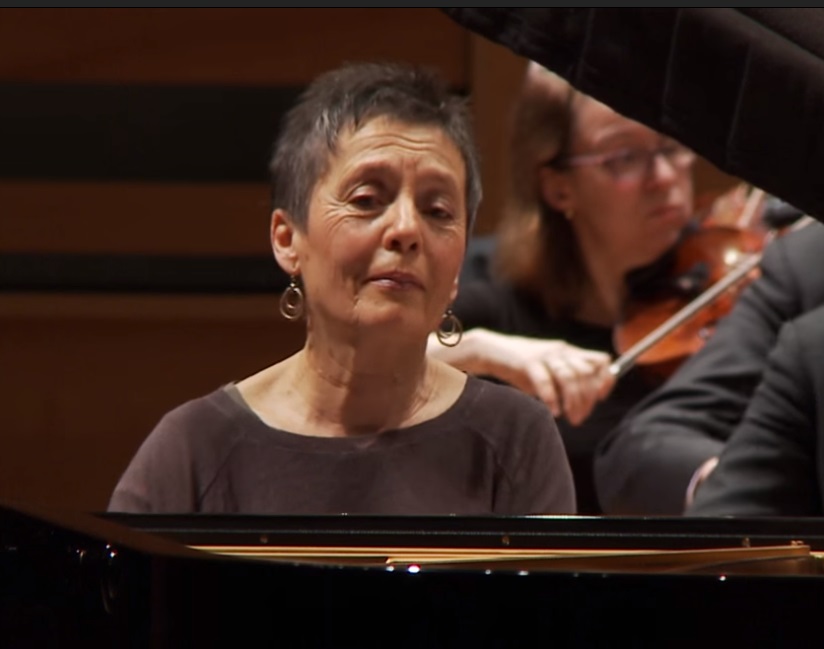The pianist Maria João Pires to be invested doctor honoris causa by UPF
The University wishes to acknowledge the career and the quality of the performances by the Portuguese concert pianist, as well as her social work and unique commitment to the education of young musicians. The investiture ceremony will take place on 20 February on the Ciutadella campus.

Maria João Pires, one of the most celebrated pianists and performers of classical music in recent decades, with a career spanning nearly seventy years, will be invested doctor honoris causa by Pompeu Fabra University on 20 February 2019 in the auditorium of the Ciutadella campus.
At the proposal Jaume Casals, UPF rector, the Board of Governors of 14 December 2018 approved the awarding of an honorary doctorate to the Portuguese pianist, who currently resides in Belgium, in recognition of her artistic excellence and her contribution to the world of music, as well as her role in education and as a mentor for young talent in this field.
She is the third woman to receive the highest distinction awared by the University
She is the second woman in succession to receive the highest distinction awarded by the University having granted it in the 2017-2018 academic year to Dorcas Muthoni, the Kenyan engineer and entrepreneur; and the third in the history of UPF since the 2009-2010 academic year when Michelle Bachelet, former President of the Republic of Chile, was honoured.
In addition to her investiture at UPF, Maria João Pires will complete her stay in Barcelona with a piano concert at the Palau de la Música. It will be held on 22 February as part of the Ibercamera season, 35 years after her debut in the Catalan capital. She will be offering a programme that will include a selection of Mozart’s “Sonatas” and Chopin’s Nocturnes, two of the musicians who have been most prominent in the pianist’s repertoire throughout her career.
A performer of themes from classicism and romanticism with a long career
Maria João Pires (Lisbon, July 1944), was born into a family of great artistic sensitivity. At the age of four she took the stage to play her first concert. She began her artistic studies at the conservatory of the hometown, where she met Campos Coelho and Francine Benoit, and continued them in Germany, first at the Munich Music Academy with Rosl Schmid, and later in Hanover with Karl Engel.
Since then, Maria João Pires has performed around the world with major orchestras such as the Berliner Philarmoniker, the Boston Symphony Orchestra, the Royal Concertgebouw Orchestra, the London Philharmonic, the Orchestre de Paris, and the Wiener Philharmoniker.
Her repertoire, within the genres of classicism and romanticism, is focusing on Mozart, Beethoven, Schubert and Chopin.
Her repertoire mainly focusing on Mozart, Beethoven, Schubert and Chopin, Pires was first linked to the Erato record label for fifteen years, and then, from 1989, with Deutsche Grammophon. She left the label after considering that its trade policies were based on the use of its artists’ physical attributes, putting aside their artistic qualities.
Among her best performances, within the genres of classicism and romanticism, are Beethoven’s Sonatas (included in the album Moonlight); all of Schubert’s Impromptus (included in the album Le voyage magnifique); Chopin’s Nocturnes; Mozart’s trios and Fantasia; and the Piano Concerto Op. 54 by Schumann.
She has received various awards, including the Beethoven Bicentenary competition award in Brussels (1970), which consecrated her internationally; the Pessoa Prize (1989), the Fréderic Chopin Grand Prix International du Disc (1995), the Académie Charles Cros International Grand Prix (1996 and 1997); Grand Prix du Disc in honorem (1997) and the UNESCO International Music Council Prize (2002).
Behind a new method to teach music to children
In 1999, Maria João Pires founded the Centre de Belgais for the Study of the Arts, near Castelo Branco, an institution devoted to the teaching and dissemination of music among children and, in general, among the rural population, through a musical training project based on an innovative teaching method. Open air music festivals used to be held there, open to all, at which Pires and other artists from all over participated.
The Belgais project aimed to contest the traditional method of conveying musical knowledge practised in most schools and conservatories.
The Belgais project aimed to contest the traditional method of conveying musical knowledge practised in most schools and conservatories, to promote mutual listening between performers of different generations. In other words, encouraging young musicians in the presence of other more veteran musicians and inviting them to share the same stage. She wanted to get promising young artists out of the dynamics that focus on exams and competitions and encourage competitiveness and fame.
Pires ran into a great many obstacles and lacked support and assistance from the Portuguese public administration, and received criticism from some of the population who did not approve of her teaching method. This lack of support led her to leave the centre in 2006, and as a sign of protest, she went to live in Brazil.
Her period in Belgium began in 2012 as a resident teacher at the Queen Elisabeth Music Chapel (Waterloo), where she taught young pianists until 2016. There, where she currently resides, she undertook two additional projects: “Equinox”, which offered aid to underprivileged children through choir singing, and “Partitura” with the Chapelle Musicale of Brussels, to promote the careers of young talent, a programme which involved Barcelona pianist Ignasi Cambra.
